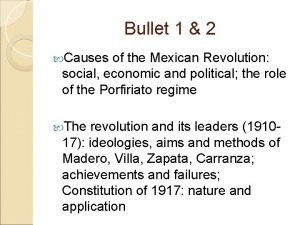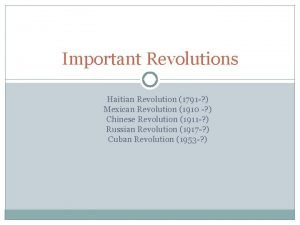Important Revolutions Haitian Revolution 1791 Mexican Revolution 1910









- Slides: 9

Important Revolutions Haitian Revolution (1791 -? ) Mexican Revolution (1910 -? ) Chinese Revolution (1911 -? ) Russian Revolution (1917 -? ) Cuban Revolution (1953 -? )

First of all, what the heck is Nationalism? Political Nationalism The belief that a country’s politics/government is better than all others. This usually leads to hostility, war between countries, civil war, etc. Cultural Nationalism Pride in one’s culture, heritage, language, etc. Does NOT include the belief that one country is any better than another. This usually leads to advancements, celebrations, education, etc.

Haitian Revolution 1791 -? Slave owners were dependent on the black Haitians to work the sugar cane crops in order to export sugar to Europe. Eventually people in Haiti were divided into three strict castes Blancs =white landowners Mulattoes=free blacks, usually with white fathers Slaves=African Born or those of pure African descent The slaves, who outnumbered the others 10 to 1, eventually rose up to fight for their freedom from France. Led by Toussaint L’Ouverture Declared a free republic in 1804


Mexican Revolution 1910 -1929 People in Mexico were sick of the rule of Porfiro Diaz, who had been in power for almost 20 years. Francisco Madero led a revolt against the long time ruler which kicked off the revolution The conflict started as a revolt against the established government but turned into a multi-sided civil war Over the course of the revolution, many leaders came in and out of power. Began to come to a resolution with the drafting of the Mexican Constitution of 1917

Chinese Revolution 1911 -? Goal of the revolution was to overthrow the Qing Dynasty and establish the Republic of China Was a reaction to 3 main factors: The decline of the Qing state (couldn’t modernize/prepare china for future, used Mandate of Heaven to justify rule. ) Domestic Decline Majority of Han China’s resentment towards the Manchu ruling minority China has operated as a Republic ever since the revolution.

Russian Revolution 1917 Revolution was started by Vladimir Lenin to establish Russia as a true Communist country. Citizens were unhappy with the quality of life under Czar Nicholas When Lenin passed away early in the Revolution, Joseph Stalin and Leon Trostsky stepped up to lead. However, Stalin proved to be more manipulative and power-hungry than the previous Czar. Citizens continued to starve, be murdered, and live in poverty. Revolution was effective in eliminating the current system of czars and czarinas, but ineffective in establishing an equal, Communist society.

Cuban Revolution 1953 -59 The goal of this revolution was to overthrow Cuban dictator Fulgencio Batista Fidel Castro stepped up to lead the revolution and was supported by the majority of citizens Batista was ousted in ‘ 59 and replaced by a revolutionary government led by Castro However, Castro eventually reformed along Communist lines to create the Communist Party of Cuba in 1965.

So how are the revolutions in Egypt and the Middle East different…. Use of Technology For the first time in history, revolutionaries are rallying support via social media networks Makes the revolutions world affairs rather than just affairs of the individual country Influence of Young People In the past, revolutions have been headed by older, political leaders. For the first time, young people are taking the lead and demanding a more progressive system















